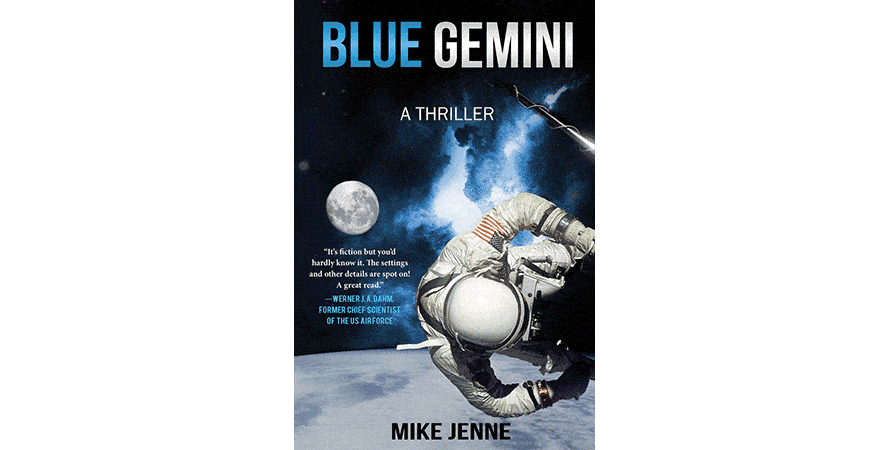Category: Fiction
Reviewed by Clifford R. McMurray
From Ad Astra Summer 2018
Title: Blue Gemini
Author: Mike Jenne
NSS Amazon link for this book
Format: Hardcover, Paperback, Kindle, audiobook
Pages: 576
Publisher: Talos
Date: May 2015
Retail Price: $24.99/16.99/12.99
ISBN: 978-1631580475
Historically, the Space Age was born in a Cold War contest for the high ground between the U.S. and the Soviet Union. Both sides worried about the other getting a decisive military advantage through space-based reconnaissance or weapons, and neither side knew whether crewed or uncrewed platforms would serve military purposes better. The Russians eventually flew a couple of military space stations under cover of the Salyut civilian space station series. The U.S. came close to flying a small military space station called the Manned Orbiting Laboratory (MOL) before deciding that there was no need to put soldiers in space to perform reconnaissance functions that could be better accomplished with uncrewed satellites like the Keyhole series. This novel is an exercise in alternate history. It assumes that the cancelled MOL program, which would have used modified Gemini capsules for crew transport, was replaced with a secret Air Force program called Blue Gemini which flew Geminis to intercept Soviet spacecraft suspected of being orbital nuclear warhead platforms.
As the story opens in 1968, we are introduced to two very different Air Force officers. Lt. Scott Ourecky is an Air Force engineer who wanted to be a pilot but was rejected for flight training (there are hints that this was due not to a lack of aptitude, but the personal bias of his flight examiner). He is serving his remaining time in uniform while thinking ahead to a possible career with NASA. Major Drew Carson is a great pilot with an ego to match, one of a handful of pilots training for Blue Gemini. Not to put too fine a point on the matter, Carson is a macho jerk; a very unsympathetic character.
Carson’s first attitude toward Ourecky, when Ourecky is drawn into the project on a parttime basis to help with trajectory design, is one of disdain. Ourecky is a Boy Scout type who makes a first impression of being soft. Abrasive, hard-driving Carson soon drives his copilot right out of the program with a nervous breakdown. Because nobody else is available for the simulator runs, Ourecky gets pressed into service on a “temporary” basis which becomes permanent when he shows he’s more than up to the job. The simulator runs are long and grueling, and by the time they’re over, both men have changed. Carson has changed more; he has become more vulnerable. Ourecky has become tougher, but as we’ve gotten to know him better, we’ve seen he wasn’t really all that soft to begin with. They were never meant to be a permanent team, but circumstances have conspired to make them one, and put them into space together on the first Blue Gemini flight.
This is a techno-thriller in the vein of Tom Clancy, and Jenne has obviously done his research well. Some books fall into the trap of too much technical detail, but he strikes just the right balance for verisimilitude. The descriptions of the hardware and the dialogue are convincing and apparently accurate. I found Blue Gemini an engaging read, and I think anyone with an interest in this period of space history will find it equally to their liking. The spaceflight portion of the book is very realistic. The story is real enough to leave you believing that something like this could have actually happened.
There are some flaws in the book, but they are ones somewhat expected in a first novel by a writer still learning his craft. Pacing is an issue: the climax isn’t very strong. Characterization isn’t yet Jenne’s strong suit either. One of the supporting cast in particular, a retired general from Texas working as a civilian executive on the project, was particularly grating: wearing a cowboy hat and saying “pardner” and other stereotypical cowboy expressions every time he speaks just didn’t strike me as real. Maybe Jenne knows a rancher from Texas with this kind of affectation, but I’ve never met one—and I think most Texans would just roll their eyes. Fortunately, not all the characters are this irritating, and some of them (particularly the Russians) are quite well drawn. I’ll be looking to see Jenne improving his prose as he gains experience.
A rule of theater says that if there’s a gun hanging on the wall of the stage, the play isn’t over until it goes off. There are quite a few unfired guns left on the wall of this story when you get to the last page. Characters whose stories have only begun to be told include an alcoholic Air Force sergeant on his way to a dishonorable discharge, some members of the Soviet military rocket forces and KGB, and an American covert operative setting up emergency landing sites in Africa. I expect we’ll see those guns fired in upcoming books. I’ll be back for more.
© 2018 Clifford R. McMurray
Please use the NSS Amazon Link for all your book and other purchases. It helps NSS and does not cost you a cent! Bookmark this link for ALL your Amazon shopping!



















